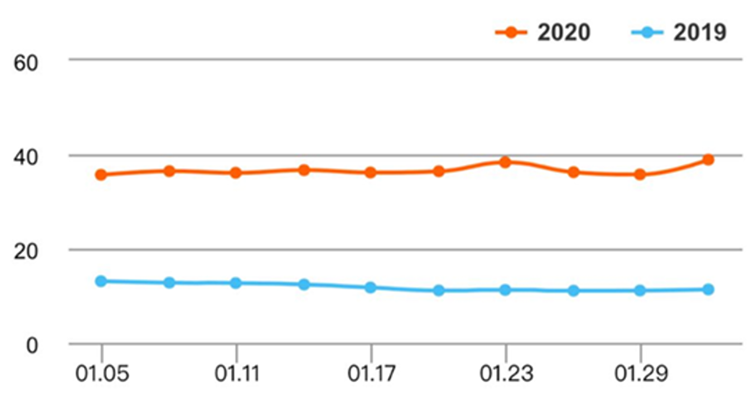



Genesus Global Market Report: China - February 2020

Market Conditions:
In China, the price for Pork normally rises and is greatest during the month prior to the Chinese New Year. However as indicated in the chart below, there was no sharp rise in pork prices this year due to the Central Government’s policy of increasing pork imports and strategically releasing frozen pork from its central reserve system.

To support the increase of imports of pork and other meat products, GACC actively expanded the sources of imports and accelerated the entry of pork and other meat products into the country. Over the course of the year, 16 new countries were granted access to the China market for their meat products and the range of meat products already approved was expanded.
To stabilize pork prices, frozen pork from the central reserve was released seven times beginning in September, totaling 170,000 tons. In 2019, China imported 2.108 million tons of pork, an increase of 75 percent. Imports of beef totaled 1.659 million tons, up 59.7 percent. The trend is expected to continue through 2020.
The proactive strategy was effective in assuring pork was readily available to the people and prevent upward pricing spikes during this all-important holiday season. Normally for two to three months after CNY, the price of pork will drop to the lowest point of the year due to the decrease in demand. However, this year we may not see much of a price drop due to the significant shortfall created by ASF.
On Thursday, January 30, 2020, in China the average price of hogs was 36.32 RMB/kg ($2.31 U.S. live weight a lb.) which was steady with the prior week.
We believe the hog price is an indicator of demand. If the hog price holds steady, it means that the people of China continue to eat pork.
On January 17, 2020, the national statistics bureau (NSB) released the national economic performance in 2019. According to the report, China raised 540 million pigs in 2019, down 21.6 percent year on year and 150 million less than in 2018. Pork production in 2019 was 42.55 million tons, down 21.3 percent and 11.49 million tons from 2018. In addition, according to the data released the number of pigs raised by the 11 public listed pig companies in 2019 was 41,612,300, accounting for 7.65 percent of the country's total and nearly 6 million fewer than in 2018.
Coronavirus:
However, the big news over Chinese New Year and spring festival was the emergence of the Coronavirus originating from Wuhan. The new coronavirus pneumonia epidemic is affecting everyone's heart and many pig enterprises are contributing to the fight against the outbreak of their own initiative.
According to incomplete statistics, Muyuan group donated 200 million yuan ($28.5 million), COFCO group donated nearly 100 million yuan ($14.25 million), CP group donated 50 million yuan ($7.1 million), and Zhengbang group donated 20 million yuan ($2.85 million) to Hubei province. Furthermore, Wens donated 15 million meat and 10 tons of disinfectant while TQLS donated their Sun Daily eggs valued at 1 million RMB to the cause. More donations from pig breeding enterprises continue.
Market Outlook:
Our unofficial survey of industry leaders indicates the market is expected to remain strong in the coming year. The shortfall of pork from ASF remains and we believe the people of China will continue to consume Pork as their meat protein of choice.
The question is how much pork reserves remain after Chinese New Year and how long will these supplies last? One can only anticipate that the policy to import record amounts of pork meat from abroad will continue until the recovery of the domestic production is realised.
China has announced a plan to rebuild its own domestic pork production capacity and capability. The government is pledging subsidies toward the construction of new large scale modern farms with a target to regain up to 80 percent of its previous production within the next three years.
Producers will need high quality genetics to avoid the loss of production and lowered efficiencies resulting from stocking their farms with commercial gilts saved back from the finishing floors. No doubt there would be a significant drop in maternal performance and kilograms of pork produced as a result.
We believe it is in China’s own best interests to import high quality GGP genetics to resupply its own breeding herds and rebuild its own production systems. The cost to import the number of high quality breeding pigs needed to build up China’s own self-sufficiency is but a fraction of cost of importing billions of dollars of Pork meat.
Realizing the global supply is quite limited and only a handful of countries have the established protocol to export to China, it will take many years to fill the void. Fortunately, Genesus has the World’s largest Registered Purebred GGP Nucleus Herd and is committed to helping its friends and clients in China resupply their breeding farms and regain lost production.







